Nicaragua: Life in the catacombs
The brutal repression of the regime — led by Daniel Ortega and Rosario Murillo — has crushed the opposition and sent many into exile. From Managua, EL PAÍS reports on how the ruling couple has spread fear in Nicaraguan society, turning their critics into ghosts
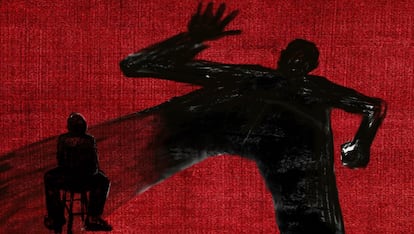
(The journalist who filed this report from Managua cannot have their name printed, due to security concerns.)
Nicaragua is a country dominated by fear. Effectively converted into a police state, even waving the blue-and-white flag can be seen as a crime, just like saying Mass in a rural church or celebrating the triumph of a beauty queen can land you in trouble.
Forced exile, prison sentences, expropriations, harassment, threats and — in hundreds of cases — the loss of citizenship are common punishments under the regime of President Daniel Ortega and his wife, Vice President Rosario Murillo. The couple doesn’t tolerate any hint of dissent.
This is why — as a journalist — I write under the condition of anonymity. This article is a portrait of the catacombs inhabited by those who oppose the regime. The sources consulted are journalists, figures in the Catholic Church, former members of political parties, or active members of opposition movements that have emerged in recent years. They are citizens who ask to be quoted under pseudonyms, so as to protect themselves and their families. Their testimonies show an internal opposition that is disjointed, inactive and, above all, fearful… even after having fled the country.
“God forbid I say that I’m a journalist”
Lucy — in her early-50s — hasn’t gone to the movies in five years, for fear of what might happen to her in a public place. She’s a journalist and a critic of the government — a forbidden combination. Even something so simple and seemingly minor can be “painful” for her. Going to the movies was her favorite pastime before the 2018 protests, when she was involved in several opposition movements that led marches against the ruling Sandinista party. Later, she participated in the committees to assist the families of the murdered, the injured and the political prisoners.
When I met her in mid-2019, she was delivering groceries to La Modelo prison, in Tipitapa, on the outskirts of Managua. She would wake up at dawn and pick up the mothers of political prisoners who lived far away, to give them a ride to the jail.
Lucy had to withdraw from solidarity movements when the repression worsened. But her face had been seen in the jail, while she had participated in the call to hold demonstrations in her city. So, she decided to disappear. “I live as locked up as possible,” the opposition member admits. She moved houses two years ago. She now only leaves to attend family gatherings.
“I don’t go out to public places, because I don’t want to meet people I know who are related to the regime,” she explains. In fact, many of her acquaintances believe that she left Nicaragua — that she went into exile, or that she migrated to the United States, as more than 600,000 citizens have done since the crisis broke out. Her greatest fear is that Sandinista sympathizers will recognize her and report that she’s in the country. The consequence would be immediate: arrest or exile.
Of course, her decision to stay meant ceasing to practice her profession. “God forbid I say that I’m a journalist,” she sighs, as if being one were a crime. Few journalists remain in Nicaragua. We take measures similar to those that she has taken: not posting anything critical of the Ortega government on social media or in WhatsApp groups, nor attending meetings with colleagues or opposition activists who are still in the country. The latest report from the Foundation for Freedom of Expression and Democracy — published in October 2023 — revealed that at least 222 Nicaraguan journalists have been forced into exile due to harassment and repression.

On May 3, just before 6 p.m., the police carried out a massive hunt for opponents of the regime. Dozens of officers were deployed across 13 of the 15 departments (regions) of Nicaragua in simultaneous raids. In a matter of hours, they detained 57 citizens, including informants, political activists and peasant leaders. They were immediately taken to Managua to be accused in secret sessions. The next morning, they were returned to their homes.
During the 12 hours in which they were detained, they were interrogated. They were only released on the condition of reporting periodically to the police authorities. From time to time, they sign a document, stating that they’re in Nicaragua.
During the raid, I also hid, as a precaution. I slept in a different home for several days. I was afraid that the police would look for me at my place of residence. It’s not the first time I’ve hidden to avoid being captured. In mid-2022, when the homes of a La Prensa journalistic team were persecuted and raided, I lived at another address for months. But I eventually went back to my house. The desire to see my family outweighed my fear of being arrested.
One of those arrested in that raid was Juan, an opponent from a northern region, who was involved in the 2018 protests. I met Juan during those turbulent days, when he told me his version of the police attack against some protesters who had blocked access to a highway. Three young people were shot to death. At the time, I interviewed him in a safehouse, while soldiers were patrolling outside.
When I called him for this report, Juan told me that he no longer got involved “in such topics” and quickly ended the conversation. EL PAÍS tried to communicate with other people who were detained during the massive raid in May 2023, but none of them wanted to talk about it. “We’ve decided to be still and silent, rather than go into exile,” Lucy says. “The truth is that people are so afraid that they no longer even want to file a report when a family member has been arrested for political reasons.”
Capturing the municipalities
The last time I spoke with Julio — a 60-year-old farmer from the center of the country — he was working on his farm with his family. His town was one of the most opposed to the Ortega government. When I arrived at his house at the beginning of 2021, he belonged to a liberal political party that, until then, had won every municipal election it had participated in. The Sandinista National Liberation Front (FSLN) had never governed in Julio’s town.
Julio used to host colleagues in his house to talk about politics. He said, without fear, that his people should “be an example, so that throughout Nicaragua, there’s no longer any fear of tyrants.” But everything changed with the results of the municipal elections in November 2022, when all the country’s 153 mayoralties were left in the hands of the Sandinistas, accelerating the implementation of a single-party regime. The elections were held without any real opposition, after several political parties were disqualified.
“When we lost the mayor’s office,” Julio recalls, “Sandinista militants began to harass me. The police would park outside my house and threaten me so that I wouldn’t continue in politics.”
In February 2022, hooded men entered a plot of Julio’s land, where corn was being planted. Without saying a word, they threw Julio to the ground, held him down with his hands behind his back and took his cell phone to check it. They threatened to kill him if he continued in politics. “Right then and there, I decided to leave the party, because I didn’t want to be arrested or killed,” he continues.
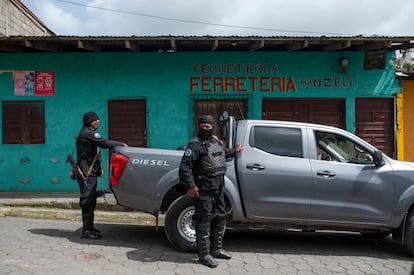
In September of that year, he emigrated to the United States. Still, things haven’t been going well for him. He fell down while working, broke his pelvic bone and was bedridden for four months. “I’m hoping to return [to Nicaragua]... but I see that the situation is getting more and more difficult,” Julio says by phone from Indianapolis.
“How’s the opposition doing in Nicaragua?” I ask.
“Deactivated… because these people [Ortega and Murillo] are satanic. They want to have [full control] over the political organizations. For us, there’s nothing. There’s no way to have a space. As soon as they find out about anything, they’re looking for ways to neutralize you.”
Fearful priests
Fear. This is what Catholic priests experienced in Nicaragua, when the police carried out a hunt in early October 2023. Six parish priests from the north of the country were detained. Then, there was another raid over the Christmas holidays. Last Sunday, 17 of the arrested priests and seminarians — along with two bishops, Isidoro Mora and Rolando Álvarez, symbols of resistance who had been detained since August of 2022 — were all exiled to Rome.
A police source informed me that the October arrests occurred after Australian journalist Prue Lewarne released an interview with a Nicaraguan priest — without showing his face or identifying him — in which he spoke about the repression that the Catholic Church experiences in Nicaragua. According to the source, the arrests were made to identify who spoke to Lewarne.
The Catholic Church has become a target of repression. After wiping out the opposition — more than 1,300 members have been imprisoned in the last five years, while at least 300 have been exiled — and eliminating political parties and more than 3,000 NGOs, the Ortega regime focused its attacks on critical bishops and priests. Human rights investigator Martha Patricia Molina keeps a detailed record of the attacks. By the end of 2023, she had registered 275 incidents, the highest number since this data began to be collected upon the outbreak of the 2018 political crisis.
Priests have been the subject of permanent surveillance. Damage has been done to churches — they’ve been shot at, firebombed and looted. Masses have been suspended. There have been cuts to basic services, with exorbitant fines imposed on Church properties, while the bank accounts of several Catholic organizations have been frozen. More than 100 priests have been expelled from Nicaragua.
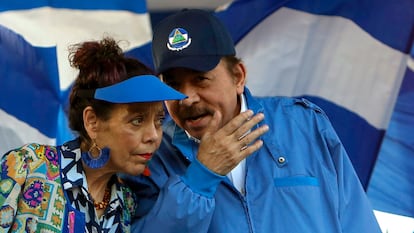
Last December 7, I walked through my neighborhood while one of the most important and massive Catholic traditions in the country was being celebrated: La Gritería. Thousands of people take to the streets to sing to images of the Virgin Mary, which are placed on homemade altars. After the songs, the hosts give a toast. It was an atypical day for Nicaraguan Catholics, because several of the Holy Week processions were suspended by the police. La Gritería, however, is still tolerated.
Control via WhatsApp
Roberto is a political activist in his 20s, belonging to a movement that emerged in 2018. He was one of the organizers of the marches in the town where he lived. In the first months of the revolt, he was captured, along with other members of his family. He was sentenced to five years in prison, accused of “attacking members of the National Police.”
He got out six months later, in June 2019, with an amnesty law that the National Assembly approved for those who were imprisoned during the protests. But that didn’t mean that the harassment came to an end. “I was left with the mark of being a political prisoner,” Roberto laments. In fact, he was detained four more times, although he wasn’t held overnight again. “They captured me and released me quickly… they just told me not to keep getting into any more trouble,” he notes.
Roberto continued meeting secretly with several young activists, while police patrols besieged his house. “They always arrived on commemorative dates of the [2018] rebellion, because they didn’t want to let me leave the house... but they never caught me at any political meeting,” he explains.
One day, a police inspector came to his house. The man threatened him: “Don’t get into any trouble, or you’ll go to prison.” The police officer told him that, from that day onwards, Roberto would have to report monthly to him via WhatsApp. On a specific day of the month, Roberto sent a photograph and his location to the inspector. “If you don’t [message] me, the patrol will come to your house immediately,” the officer warned him.
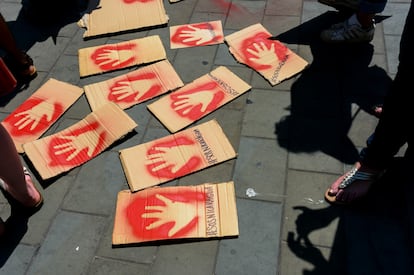
Roberto reported to the inspector for four months until mid-September, when there was a raid that captured several members of his political movement. “I thought they were coming for me,” Roberto recalls. He fled the country the next day.
Weeks later, he managed to cross irregularly into the United States. He’s now in Texas, where he works in construction. One afternoon, however, he received a message from the inspector. Roberto had forgotten to send a picture and his location. He explained everything to the officer, but he responded demanding a photo and the exact address of his residence in Texas. Scared, Roberto wrote him the last message to end the conversation: “You can send the patrol to my house so that you can see that I’m no longer in Nicaragua.”
Roberto’s fear — like that of most emigrants and exiles — didn’t end when he crossed the U.S. border. Despite being thousands of miles away from home, he doesn’t want to be identified. He still speaks softly on the phone, afraid of what reprisals his wife and his two young children — who are still in Nicaragua — may face.
With the domestic opposition devastated, Ortega and Murillo’s new strategy to sow terror has turned against the relatives of critics who have already fled. In recent weeks, for example — and coinciding with Christmas — relatives of dissidents were prohibited from entering and leaving the country. This left entire families divided or in limbo. Some victims of this policy included Miss Universe — Sheynnys Palacios — and the owner of the Miss Nicaragua franchise, Karen Celebertti, along with her family.
A feeling of helplessness afflicts parishioners in Nicaragua when their priest is arrested. There’s a feeling of emptiness that grips families when the police knock on the doors of a house, to take someone into custody for opposing the regime. Ortega and Murillo have turned Nicaragua into a country silenced by fear, a place where repression rules.
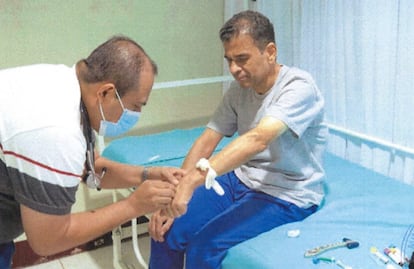
Sign up for our weekly newsletter to get more English-language news coverage from EL PAÍS USA Edition
